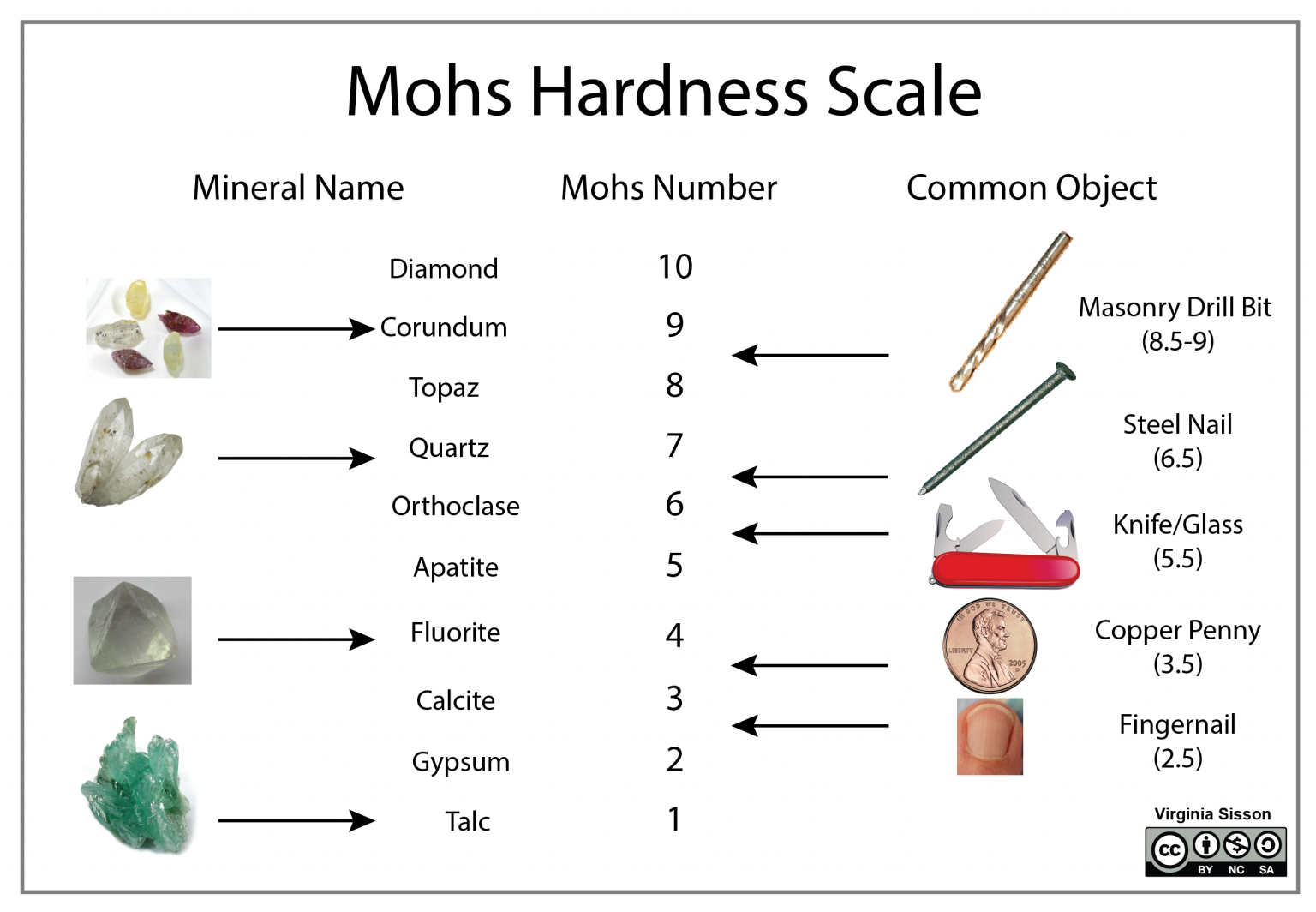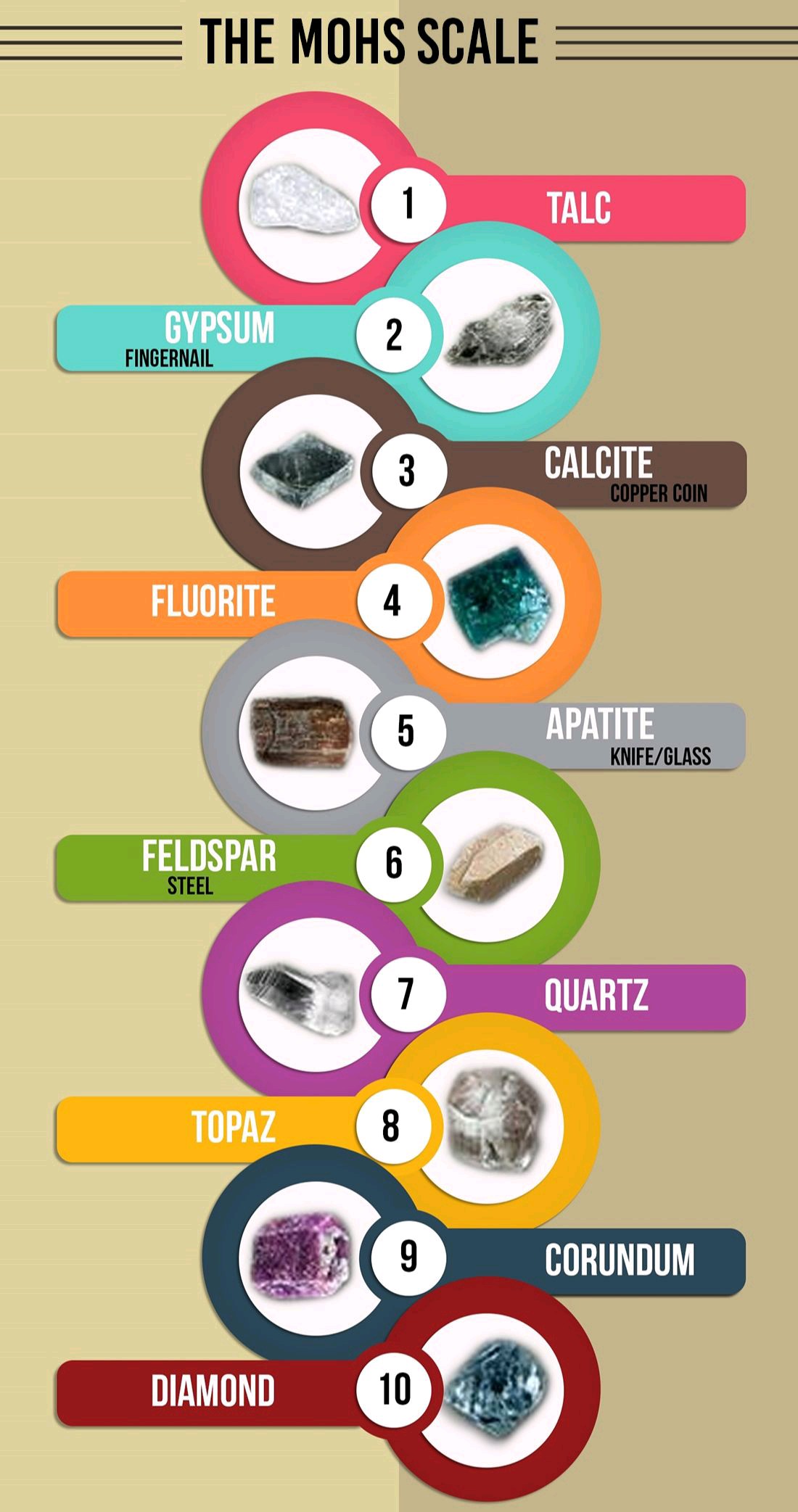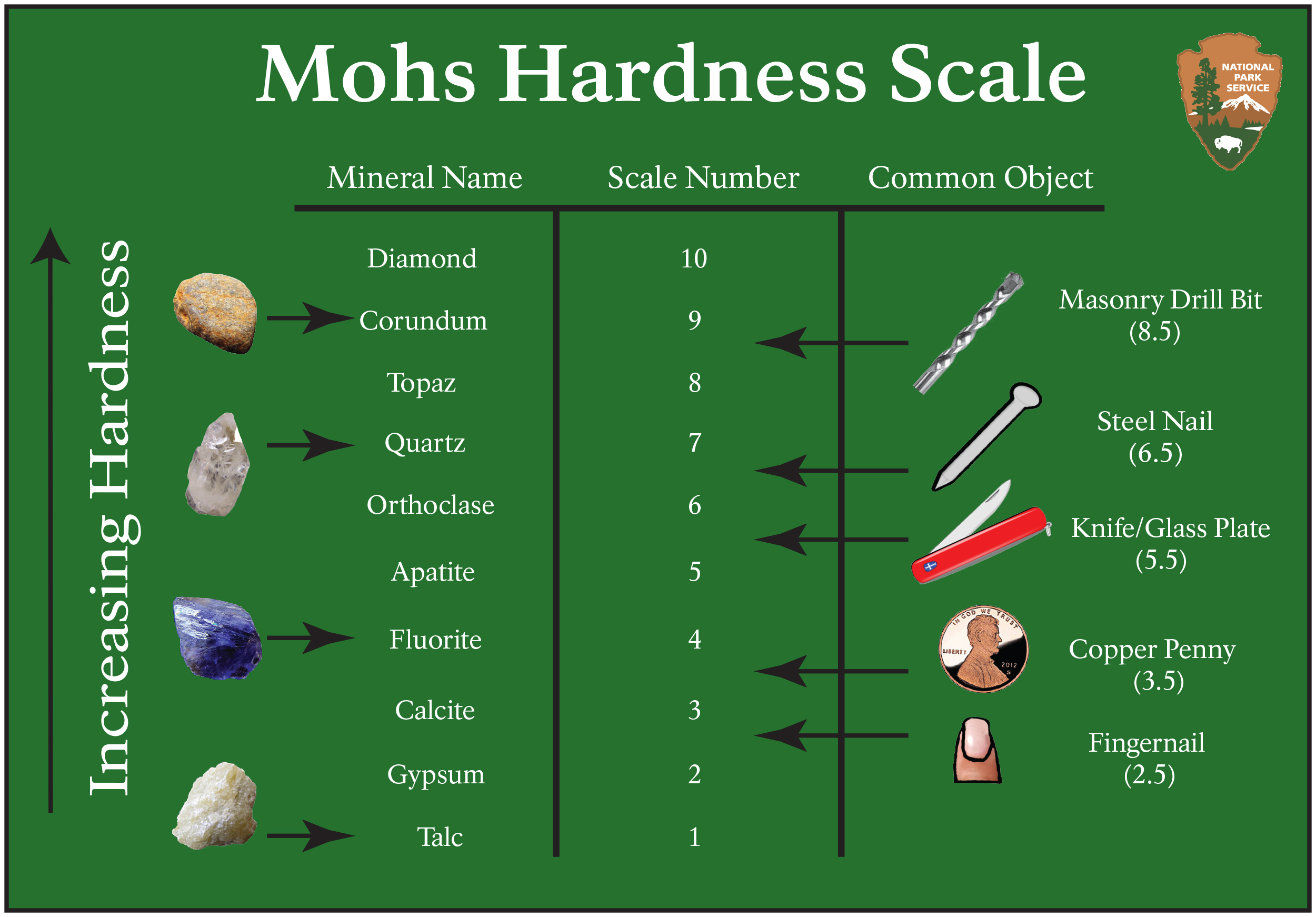Printable Mohs Hardness Scale
Printable Mohs Hardness Scale - The scale isn’t perfect, but it’s a great. Even if the mohs testing does not tell you what it is, knowing its relative hardness can help you figure out what it isn't. Mohs hardness tables hardness number original scale modified scale 1 talc talc 2 gypsum gypsum 3 calcite calcite 4 fluorite fluorite 5 apatite apatite 6 orthoclase orthoclase 7 quartz. A mineral's hardness is a measure of its relative resistance to scratching, measured by. German geologist friedrich mohs introduced the mohs hardness scale in 1812. By printing out this quiz and taking it with pen and paper creates for a good. It is based on the ability of one mineral to scratch another: The mohs hardness scale is used as a convenient way to help identify minerals. Mohs scale of hardness mohs scale of hardness agate 7 alexanderite 8 amber 2 amethyst 7 apatite 5 aquamarine 7 aventurine 7 azurite 3 asurmalaehite 3 bloodstone 7 calcite 3. To determine the hardness of concrete in relation to the mohs. This test compares the resistance of a. Are you teaching a rocks and minerals unit or mineral identification? The scale isn’t perfect, but it’s a great. The mohs hardness scale is a qualitative test that measures the hardness of a mineral by its ability to visibly scratch softer minerals. It is based on the ability of one mineral to scratch another: Even if the mohs testing does not tell you what it is, knowing its relative hardness can help you figure out what it isn't. Mohs hardness scale was developed in 1812 by friedrick mohs (an austrian mineral expert) as a method to identify minerals. By printing out this quiz and taking it with pen and paper creates for a good. Devised by the german mineralogist frederich, mohs in 1812, hardens is one of the most important tests for identifying mineral specimens. This scale uses 10 common minerals to represent variations in. The mohs hardness scale is a qualitative test that measures the hardness of a mineral by its ability to visibly scratch softer minerals. It then asks questions to test understanding of the. This scale uses 10 common minerals to represent variations in. A mineral's hardness is a measure of its relative resistance to scratching, measured by. Even if the mohs. It is based on the ability of one mineral to scratch another: Even if the mohs testing does not tell you what it is, knowing its relative hardness can help you figure out what it isn't. German geologist friedrich mohs introduced the mohs hardness scale in 1812. In addition to using the scale for mineral identification, it is also helpful.. This is a free printable worksheet in pdf format and holds a printable version of the quiz moh's hardness scale. This scale uses 10 common minerals to represent variations in. 3 calcite copper penny just. By printing out this quiz and taking it with pen and paper creates for a good. Even if the mohs testing does not tell you. 2 gypsum fingernail scratches it. It then asks questions to test understanding of the. This illustrated handout of mohs hardness scale will help your students test mineral hardness and identify common. The mohs hardness scale is used as a convenient way to help identify minerals. This scale uses 10 common minerals to represent variations in. The scale isn’t perfect, but it’s a great. One of the most important tests for identifying mineral specimens is the mohs hardness test. By printing out this quiz and taking it with pen and paper creates for a good. It is based on the ability of one mineral to scratch another: This scale uses 10 common minerals to represent variations. The document provides instructions to complete the mohs mineral hardness scale by drawing and coloring pictures of 10 minerals in boxes. The mohs scale (/ m oʊ z / mohz) of mineral hardness is a qualitative ordinal scale, from 1 to 10,. Mohs scale of hardness mohs scale of hardness agate 7 alexanderite 8 amber 2 amethyst 7 apatite 5. Mohs hardness tables hardness number original scale modified scale 1 talc talc 2 gypsum gypsum 3 calcite calcite 4 fluorite fluorite 5 apatite apatite 6 orthoclase orthoclase 7 quartz. The mohs hardness scale is used as a convenient way to help identify minerals. In addition to using the scale for mineral identification, it is also helpful. A mineral that scratches. The mohs scale (/ m oʊ z / mohz) of mineral hardness is a qualitative ordinal scale, from 1 to 10,. This scale uses 10 common minerals to represent variations in. The mohs hardness scale is a qualitative test that measures the hardness of a mineral by its ability to visibly scratch softer minerals. Earth science moh’s scale of mineral. Even if the mohs testing does not tell you what it is, knowing its relative hardness can help you figure out what it isn't. One of the most important tests for identifying mineral specimens is the mohs hardness test. Mohs' scale of hardness represents a scale of relative mineral hardness rather than a scale of absolute mineral hardness. Are you. This test compares the resistance of a mineral to being scratched by ten reference minerals known. This scale uses 10 common minerals to represent variations in. A mineral's hardness is a measure of its relative resistance to scratching, measured by. Even if the mohs testing does not tell you what it is, knowing its relative hardness can help you figure. Mohs hardness tables hardness number original scale modified scale 1 talc talc 2 gypsum gypsum 3 calcite calcite 4 fluorite fluorite 5 apatite apatite 6 orthoclase orthoclase 7 quartz. This scale uses 10 common minerals to represent variations in. This test compares the resistance of a. The scale isn’t perfect, but it’s a great. It then asks questions to test understanding of the. Mohs’ scale is a way of describing mineral hardness. In addition to using the scale for mineral identification, it is also helpful. The scale ranges from 1 (the softest) to 10 (the hardest) and each of the 10 numbers is represented by a certain mineral. Even if the mohs testing does not tell you what it is, knowing its relative hardness can help you figure out what it isn't. This is a free printable worksheet in pdf format and holds a printable version of the quiz moh's hardness scale. This illustrated handout of mohs hardness scale will help your students test mineral hardness and identify common. Mohs scale of hardness mohs scale of hardness agate 7 alexanderite 8 amber 2 amethyst 7 apatite 5 aquamarine 7 aventurine 7 azurite 3 asurmalaehite 3 bloodstone 7 calcite 3. Are you teaching a rocks and minerals unit or mineral identification? The mohs scale (/ m oʊ z / mohz) of mineral hardness is a qualitative ordinal scale, from 1 to 10,. A mineral that scratches another will be above that. The mohs hardness scale is a qualitative test that measures the hardness of a mineral by its ability to visibly scratch softer minerals.Printable Mohs Hardness Scale
Printable Mohs Hardness Scale
Printable Mohs Hardness Scale
Printable Mohs Hardness Scale
Printable Mohs Hardness Scale
Printable Mohs Hardness Scale
Printable Mohs Hardness Scale
Printable Mohs Hardness Scale
Printable Mohs Hardness Scale
Printable Mohs Hardness Scale Printable World Holiday
Mohs Hardness Scale Was Developed In 1812 By Friedrick Mohs (An Austrian Mineral Expert) As A Method To Identify Minerals.
By Printing Out This Quiz And Taking It With Pen And Paper Creates For A Good.
This Test Compares The Resistance Of A Mineral To Being Scratched By Ten Reference Minerals Known.
Devised By The German Mineralogist Frederich, Mohs In 1812, Hardens Is One Of The Most Important Tests For Identifying Mineral Specimens.
Related Post:









